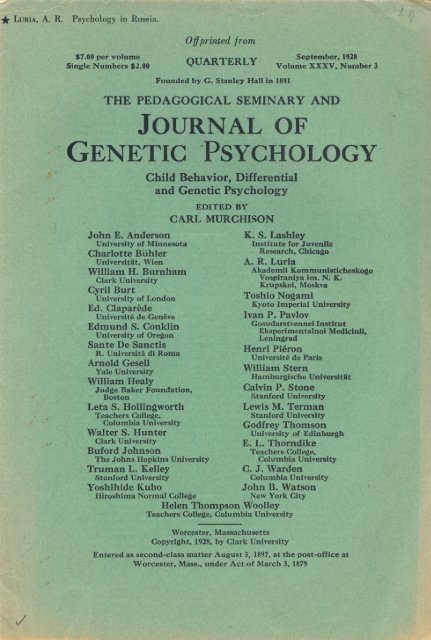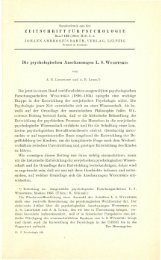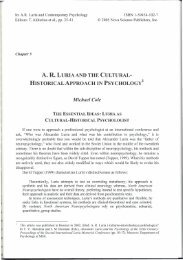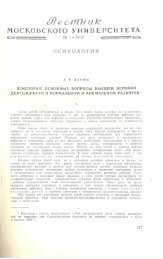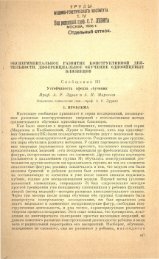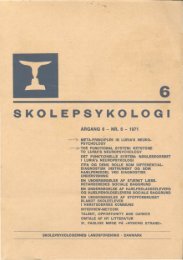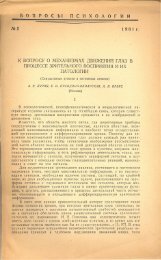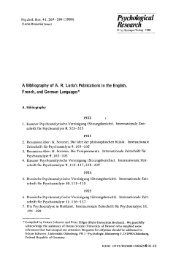Psychology in Russia - Luria, Alexander R.
Psychology in Russia - Luria, Alexander R.
Psychology in Russia - Luria, Alexander R.
Create successful ePaper yourself
Turn your PDF publications into a flip-book with our unique Google optimized e-Paper software.
* LURIA, A. R. <strong>Psychology</strong> <strong>in</strong> <strong>Russia</strong>.<br />
Offpr<strong>in</strong>ted<br />
from<br />
$7.00 per volume<br />
S<strong>in</strong>gle Numbers $1.00<br />
QUARTERLY<br />
September,1928<br />
Volume XXXV, Number 3<br />
Founded by G. Stanley Hall <strong>in</strong> 1891<br />
"<br />
THE PEDAGOGICAL<br />
SEMINARY AND<br />
JOURNAL OF<br />
GENETIC -PSYCHOLOGY<br />
John E. Anderson<br />
Child Behavior, Differential<br />
and Genetic <strong>Psychology</strong><br />
EDITED BY<br />
CARL MURCHISON<br />
K. S. Lashley<br />
University of M<strong>in</strong>nesota Institute for JuvenJle<br />
Research, Chical10<br />
Charlotte BUhler<br />
Universitllt, Wien A. R. <strong>Luria</strong><br />
William H. Burnham<br />
Clark University Vospitanlya Im, N. K.<br />
~pskoi, Moskva<br />
Cyril Burt<br />
University of London<br />
Toshio Nogami<br />
Ed. Claparede Kyoto Imperial UnJversity<br />
Universite de Oeneve Ivan P. Pavlov<br />
Edmund S. Conkl<strong>in</strong> Gosudarstvennei Institut<br />
Akademii Kommunisticheskogo<br />
University of Oreaon Eksperimentalnoi Medidnll.<br />
••<br />
Len<strong>in</strong>grad<br />
Sante De Sanctis<br />
Henri Pieron<br />
R. Universitl di Roma Universlte de Paris<br />
Arnold Gesell<br />
Yale University<br />
William Stem<br />
William Healy Hamburglsche UnJversitlt<br />
Judge Baker Foundation, Calv<strong>in</strong> P. Stone<br />
Boston Stanford UnJversity<br />
Leta S. Holl<strong>in</strong>gworth<br />
Walter S. Hunter<br />
Buford Johnson<br />
Lewis M. Terman<br />
Teachers College,<br />
Stanford University<br />
Columbia University<br />
Godfrey Thomson<br />
University of Ed<strong>in</strong>burah<br />
Clark University<br />
E. L. Thorndike<br />
Teachers College,<br />
The Johns Hopk<strong>in</strong>s University Columbia University<br />
Truman L. Kelley<br />
C. J. Warden<br />
Stanford University Columbia University<br />
Yoshihide Kubo<br />
John B. Watson<br />
Hiroshima Normal College New York City<br />
Helen Thompson Woolley<br />
Teachers College, Columbia University<br />
Worcester, Massachusetts<br />
Copyright, 1928, by Clark University<br />
Entered as second-class matter August 3, 1897,at the post-office at<br />
Worcester, Mass., under Act of March 3,1879
Journal of General <strong>Psychology</strong><br />
EDITED BY<br />
CARL MURCHISON, Clark University<br />
Frank Angell, Stanford University; F. C. Bartlett, Cambridge University;<br />
V. Borovski, GosudarstvemleiJnstitut Eksperimentalnoi Psikhologii, Moskva;<br />
G. S. Brett, University of Toronto; Karl Biihler, Universitiit, Wien ; W. J<br />
Crozier, Harvard University,' Raymond Dodge, Yale University; James<br />
Drever, University of Ed<strong>in</strong>burgh; George Dumas, UniversitJ de Paris;<br />
Knight Dunlap, The Johns Hopk<strong>in</strong>s University; Shepherd Ivory Franz, Uni-<br />
",ersity of California at Los Angl'les; H. L. Holl<strong>in</strong>gworth, Columbia Unioers;ty;<br />
T. A. Hunter, Victoria University College, New Zealand; Pierre Janet,<br />
UniversitJ de Paris; F. Kiesow, Regia Universita degli Studi, Tor<strong>in</strong>o;<br />
Otto Klemm, Universitiit, Leipzig; Felix Krueger, Universitiit, Leipzig,' William<br />
McDougall, Duke University; A. Michotte, UniversitJ de Lousra<strong>in</strong> ;<br />
Walter Miles, Stanford University,· John Paul Nafe, Clark University;<br />
A. L. Schniermann, Bekhterev Refleksologicheskii Institut po Izucheniya<br />
Mozga, Len<strong>in</strong>grad; C. E. Spearman, University of London,' Edward C. Tolman,<br />
University of California; John B. Watson, New York City; Albert<br />
P. Weiss, Ohio State University; H. P. Weld, Cornell University; Raymond<br />
H. Wheeler, Uni",ersity of Kansas; R. W. Wilcocks, Uniwersiteit van<br />
Stellenbosch, Suidafrika,· Clark Wissler, Yale University; Robert W. Yerkes,<br />
Yale University.<br />
Quarterly, published <strong>in</strong> January, April, July, and October. Devoted<br />
primarily to experimental, theoretical, cl<strong>in</strong>ical, and historical psychology.<br />
Manuscripts may be sent to any member of the Editorial Board, ot may<br />
be sent directly to the general editorial office. All subscriptions and bus<strong>in</strong>ess<br />
communications should be sent directly to the Clark University Press.<br />
Six to seven hundred pages annually. Per annum, $7.00; s<strong>in</strong>gle numbers,<br />
$2.00.<br />
The Pedagogical Sem<strong>in</strong>ary and<br />
Journal of Genetic <strong>Psychology</strong><br />
EDITED BY<br />
CARL MURCHISON, Clark University<br />
John' E. Anderson, University of M<strong>in</strong>nesota; Charlotte Biihler, Unioersltia,<br />
Wien; William H. Burnham, Clark University; Cyril Burt, University of<br />
London; Ed. Claparede, UniversitJ de Geneve; Edmund S. Conkl<strong>in</strong>, University<br />
of Oregon; Sante De Sanctis, R. Universita di Roma; Arnold Gesell,<br />
Yale University; William Healy, Judge Baker Foundation, Boston,' Leta S.<br />
Holl<strong>in</strong>gworth, Teachers College, Columbia University; Walter S. Hunter,<br />
Clark University,· Buford Johnson, T<strong>in</strong> Johns Hopk<strong>in</strong>s Unioersity; Truman<br />
L. Kelley, StanJ'ord University; Yoshihide Kubo, Hiroshima Normal College;<br />
K. S. Lashley, Institute for Juvenile Research, Chicago; A. R. <strong>Luria</strong>,<br />
Akademii Kommunisticheskogo Pospitaniya im. N. K. Krupskoi, Moskva;<br />
Toshio Nogami, Kyoto Imperial University; Ivan P. Pavlov, Gosudarst-<br />
",ennei Institut Eksperimentalnoi M edic<strong>in</strong>ii, Len<strong>in</strong>grad; Henri Pieron, UniversitJ<br />
de Paris,' William Stern, Hamburpische Unioersitdt ; Calv<strong>in</strong> P.<br />
Stone, Stanford University,' Lewis M. Terman, Stanford University,' Godfrey<br />
Thomson, University of Ed<strong>in</strong>burgh; E. L. Thorndike, Teachers Collea e,<br />
Columbia University; C. J. Warden, Columbia University; John B. Watson,<br />
New York City; Helen Thompson Woolley, Teachers College, Columbia<br />
University.<br />
Quarterly, published <strong>in</strong> March, June, September, and December. Devoted<br />
to child behavior, differential and genetic psychology. Manuscripts may be<br />
sent to any member of the Editorial Board, or may be sent directly to the<br />
general editorial office. All subscriptions and bus<strong>in</strong>ess communications<br />
should be sent directly to the Clark University Press. Seven hundred pages<br />
annually. Per annum $7.00; s<strong>in</strong>gle numbers, $2.00. Complete sets from<br />
1891 at $7.00 per volume, plus transportation.<br />
CLARK UNIVERSITY PRESS<br />
Worcester, Massachusetts<br />
U. S. A.
Offpr<strong>in</strong>ted from The Pedagogical Sem<strong>in</strong>ary and Journal of Genetic<br />
<strong>Psychology</strong>, 1928, 35, 347-355.<br />
PSYCHOLOGY<br />
IN RUSSIA*<br />
From the Psychological Laboratories of the Aka,demii Kommunisticheskogo<br />
Fo spitaniya im. N. K. Krupskoi<br />
A. R. LURIA<br />
I<br />
<strong>Russia</strong>n psychological literature, which has not been very numerous<br />
<strong>in</strong> former years, has recently shown a remarkable growth,<br />
br<strong>in</strong>g<strong>in</strong>g to life many new ideas and pr<strong>in</strong>ciples and a great many<br />
<strong>in</strong>terest<strong>in</strong>g researches. The most remarkable th<strong>in</strong>g <strong>in</strong> modern <strong>Russia</strong>n<br />
researches is the prevalence of tendencies towards an objective study<br />
of human behavior. Indeed, modern <strong>Russia</strong>n psychology has been<br />
under considerable <strong>in</strong>fluence from the American behaviorists who <strong>in</strong><br />
their turn owe very much to the <strong>Russia</strong>n physiological school of<br />
Professor Pavlov <strong>in</strong> their development of the science of behavior.<br />
The doctr<strong>in</strong>e of scientific materialism has also exercised a remarkable<br />
<strong>in</strong>fluence upon the <strong>Russia</strong>n psychologists, thanks to which the latter<br />
have given up the metaphysical and semi-metaphysical conceptions<br />
which <strong>in</strong> Europe are associated with Husserl and the phenomenologists,<br />
and <strong>in</strong> <strong>Russia</strong> with the names of Lopat<strong>in</strong>, Chelpanov, and others.<br />
The recent psychological theories of the West, such as Gestaltpsycholoaie,<br />
the work of E. R. Jaensch, and the <strong>in</strong>dividual psychology of<br />
Adler, have also had their <strong>in</strong>fluence upon <strong>Russia</strong>n psychologists.<br />
The work of the modern <strong>Russia</strong>n psychologists may be divided <strong>in</strong>to<br />
several branches. We notice a considerable development of the<br />
physiological school of Professor Pavlov, and of the reflexological<br />
school of the late Bekhterev. The psychologists as a rule share the<br />
objective position of the physiologists but carryon their work on a<br />
much broader basis, approach<strong>in</strong>g psychology from the po<strong>in</strong>t of view<br />
of that structural behavior which is determ<strong>in</strong>ed by social conditions.<br />
To that w<strong>in</strong>g belong most of the <strong>Russia</strong>n psychologists who do not<br />
accept the mechanistic po<strong>in</strong>t of view of the reflexologists. It will<br />
suffice <strong>in</strong> this connection to mention the names of Professor Kornilov,<br />
Professor Blonski (his psychological work is of a dist<strong>in</strong>ctly genetic<br />
character), Professor Bassov, and L. Vigotski. Much has recently<br />
been done <strong>in</strong> the l<strong>in</strong>e of pedology, which <strong>in</strong> <strong>Russia</strong> is understood to.<br />
be the science of the grow<strong>in</strong>g organism and its symptom complexes<br />
(<strong>in</strong>clud<strong>in</strong>g the somatic, psychological, and social peculiarities of<br />
·Received <strong>in</strong> the Editorial Office, May 17, 1928.<br />
347
348 JOURNAL OF GENETIC PSYCHOLOGY<br />
the child). Thanks to the work of the <strong>Russia</strong>n scientists pedology<br />
has made remarkable progress. The First <strong>Russia</strong>n Congress of Pedologists,<br />
which took place <strong>in</strong> January, 1928, and <strong>in</strong> the work of<br />
which over one thousand pedologists, psychologists, and physicians<br />
participated, clearly <strong>in</strong>dicated that pedology attracts great attention<br />
<strong>in</strong> <strong>Russia</strong>. We must also mention here that the science of applied<br />
psychology has greatly developed; unfortunately space considerations<br />
will not permit us to discuss that subject at any length.<br />
II<br />
The most <strong>in</strong>terest<strong>in</strong>g event <strong>in</strong> connection with the work of the<br />
physiology of behavior must be considered the publication of a new<br />
book by Professor Pavlov, "Lectures on the Work of the Large<br />
Hemispheres of the Bra<strong>in</strong>." Psychologists and those <strong>in</strong>terested <strong>in</strong><br />
psychology have long been await<strong>in</strong>g the appearance of a systematic<br />
work on the theory of the conditioned reflexes <strong>in</strong> which the author<br />
of that theory would state the results of his labor. The "Twenty<br />
Years' Experience <strong>in</strong> the Study of the Higher Nervous Activity <strong>in</strong><br />
Animals" was not a systematic exposition of the theory. That book<br />
conta<strong>in</strong>ed separate papers read by Professor Pavlov at different times<br />
and on different subjects <strong>in</strong> connection with the theory of conditioned<br />
reflexes. The "Lectures" recently published is a systematic<br />
work, the theory of that subject. Considered from this po<strong>in</strong>t<br />
of view, the publication of the "Lectures" is an event of great importance.<br />
The "Lectures" deals with the phenomenon of unconditioned<br />
and conditioned reflexes and demonstrates as the pr<strong>in</strong>cipal<br />
position of the author that the study of animal behavior can be<br />
approached only from the objective physiological po<strong>in</strong>t of view. A<br />
special chapter <strong>in</strong> that book is devoted to the technique of the study of<br />
conditioned reflexes. Several chapters of the book deal with the study<br />
of the accurate <strong>in</strong>vestigation of the activity of conditioned reflexes,<br />
the law of <strong>in</strong>hibition and its chief forms (external and <strong>in</strong>ternal <strong>in</strong>hibition<br />
are dealt with), conditions of the activity of the analyzers<br />
and the fundamental forms of the analyz<strong>in</strong>g and synthetic work of<br />
the cortex, the laws of the irradiation and concentration of nervous<br />
processes which had been carefully exam<strong>in</strong>ed <strong>in</strong> the work with<br />
conditioned reflexes, the laws of <strong>in</strong>duction as they are manifested <strong>in</strong><br />
the <strong>in</strong>hibition of an excited part of the bra<strong>in</strong>, etc.<br />
Several other chapters refer to the latest work of Professor Pavlov<br />
not yet published <strong>in</strong> the foreign press. I refer to the work which<br />
treats of the problems of dream and hypnosis, and establishes the<br />
thesis that the latter are forms of the same <strong>in</strong>ternal <strong>in</strong>hibition.<br />
Pavlov succeeds <strong>in</strong> show<strong>in</strong>g that through external agencies easily<br />
registered <strong>in</strong> the laboratory one can provoke states very like the
PSYCHOLOGY IN RUSSIA 349<br />
hypnotic state. Very close to this work is another branch of researches<br />
which aims at f<strong>in</strong>d<strong>in</strong>g ways for an objective analysis of the<br />
mechanisms that are fundamentally related to diseases of the nervous<br />
system. An objective study of dogs by the method of the<br />
conditioned reflexes afforded Pavlov the possibility of establish<strong>in</strong>g<br />
typological differences <strong>in</strong> the activity of the nervous system; it was<br />
found that some animals belong to the excit<strong>in</strong>g type and others to<br />
the <strong>in</strong>hibit<strong>in</strong>g type. Furthermore, Pavlov succeeded <strong>in</strong> provok<strong>in</strong>g<br />
someth<strong>in</strong>g which rem<strong>in</strong>ds one very much of an artificial neurosis.<br />
By a collision of the impulses of <strong>in</strong>hibition and excitation (as <strong>in</strong> the<br />
process of differentiation), Pavlov <strong>in</strong>duced a dist<strong>in</strong>ct change <strong>in</strong> the<br />
animal's behavior, which for a considerable time caused a disturbance<br />
<strong>in</strong> all the conditioned reflexes of the animal. This process, which<br />
Pavlov calls the dis<strong>in</strong>tegration of behavior, is characteristic of pathological<br />
states of the nervous system. It is impossible <strong>in</strong> this short<br />
review to consider any further this important work of Pavlov's.<br />
It is to be hoped that the American and European psychologists<br />
will soon be able to read the book <strong>in</strong> their own languages.<br />
Very close to Professor Pavlov's work are the researches of his<br />
disciples, and parallel is the work of Bekhterev's school. Both<br />
schools have shown a tendency to apply experiments with conditioned<br />
reflexes to man. Bekhterev's school has for a long time been occupied<br />
with it. Great <strong>in</strong>terest has lately been shown <strong>in</strong> the study of the<br />
genesis of the chief mechanisms of the nervous system from early<br />
childhood; a special laboratory conducted by Chelovanov at the<br />
Bekhterev Institute <strong>in</strong> Len<strong>in</strong>grad is occupied with that problem.<br />
III<br />
We shall now pass to the review of the psychological researches<br />
carried on along purely objective l<strong>in</strong>es. Professor Kornilov's work,<br />
"The Study of Human Reaction," follows this direction. This<br />
work deals with the measurement of the energetic side of behavior,<br />
with the expenditure of energy at different degrees of reaction. By<br />
the means of a dynamoscope, which Professor Kornilov constructed<br />
for the purpose, he established that by observ<strong>in</strong>g the <strong>in</strong>tensity of the<br />
reaction of the hand which is simultaneous with some other central<br />
activity, one can <strong>in</strong>directly <strong>in</strong>fer the amount of energy which that<br />
activity requires, i.e., one can estimate its energetic coefficient. After '<br />
several years of experimen tation Professor Kornilov established the<br />
basic pr<strong>in</strong>ciple of what he calls the unipolar expenditure of energy. I<br />
Such energy has the tendency to expand peripherally or centrally.<br />
This theory is of considerable theoretical <strong>in</strong>terest and has also been<br />
considered the basis for many practical <strong>in</strong>vestigations <strong>in</strong> regard to
350 JOURNAL OF GENETIC PSYCHOLOGY<br />
the application of experimental psychology to school practice, professional<br />
fitness, etc.<br />
Professor Kornilov, as well as the <strong>in</strong>vestigators of the physiological<br />
school, has objectively approached the analysis of types of<br />
behavior and has given them a new classification which takes <strong>in</strong>to<br />
consideration the rapidity of the reaction of the subject and his <strong>in</strong>cl<strong>in</strong>ation<br />
for a greater or smaller expenditure of energy. In his<br />
work Professor Kornilov took <strong>in</strong>to consideration adaptation to the<br />
environment, process of reaction as the fundamental mechanism of<br />
behavior formed under the <strong>in</strong>fluence of the social conditions of the<br />
subject, and the subjective side of the process which must not be<br />
ignored by the psychologist but which should not be studied as an<br />
<strong>in</strong>dependent phenomenon. The methodological side of this work<br />
is given <strong>in</strong> another book of Professor Kornilov's, "Modern <strong>Psychology</strong><br />
and Marxism," where he states that his po<strong>in</strong>t of view can<br />
be best formulated as the application of the doctr<strong>in</strong>e of dialectic<br />
materialism to psychology. The researches which are conducted by<br />
, the State Institute of Experimental <strong>Psychology</strong> at Moscow are of<br />
the same character, and the three volumes published by the Institute,<br />
"<strong>Psychology</strong> and Marxism" ( 1925), "Problems of Modern <strong>Psychology</strong>"<br />
(Vol. I, 1926 and Vol. II, 1928), conta<strong>in</strong> several experimental<br />
and theoretical <strong>in</strong>vestigations deal<strong>in</strong>g with the study of different<br />
types and forms of human reaction.<br />
IV<br />
The problems of pedology and genetic psychology are occupy<strong>in</strong>g<br />
a considerable place <strong>in</strong> the modern psychological literature <strong>in</strong> <strong>Russia</strong>.<br />
In 1925 appeared the first edition of Professor Blonski's "Pedology,"<br />
and <strong>in</strong> a few months there was a demand for a second edition. That<br />
book has undoubtedly played an important role <strong>in</strong> the development<br />
of the science of the child <strong>in</strong> <strong>Russia</strong>. It is the first time that pedology<br />
, has been regarded not as child psychology and not as experimental<br />
pedagogy but as a genetic science of the. growth of the child. In<br />
this book every phase of the child's development is considered from<br />
three different angles: growth, constitutional peculiarities, and behavior.<br />
Avail<strong>in</strong>g himself of a wealth of material Professor Blonski<br />
is consider<strong>in</strong>g the growth of the child from a synthetic po<strong>in</strong>t of view.<br />
Accord<strong>in</strong>g to Professor Blonski the problems of constitution, growth,<br />
and behavior are so closely comb<strong>in</strong>ed that it is impossible to understand<br />
one side of the child's life without consider<strong>in</strong>g the other sides<br />
also. The wide application of biological analysis, the development<br />
of statistical method <strong>in</strong>troduc<strong>in</strong>g a series of new and important formulae<br />
for the analysis of the somatic peculiarities of the child, the<br />
application of new biological data for the study of types of children-
PSYCHOLOGY IN RUSSIA 351<br />
all make the book a very important feature <strong>in</strong> the present pedological<br />
literature. The same views are popularly stated <strong>in</strong> other books of<br />
his: "Pedagogics," "Pedology <strong>in</strong> Public Schools," and also <strong>in</strong> the two<br />
volumes of the researches of his laboratory at the Academy of Communist<br />
Education-"Pedology and the School."<br />
Next <strong>in</strong> importance is his other book, "Outl<strong>in</strong>es of <strong>Psychology</strong>."<br />
In these essays the author attempts to give a consistently genetic<br />
po<strong>in</strong>t of view concern<strong>in</strong>g human behavior. He is <strong>in</strong>cl<strong>in</strong>ed to regard<br />
the psyche dynamically as a gradual development of the biological<br />
processes from the dream-state to the state of be<strong>in</strong>g awake. This<br />
po<strong>in</strong>t of view allows him not only to analyze the successive stages<br />
<strong>in</strong> the development of human behavior from the simplified to the<br />
most complex forms, but also to f<strong>in</strong>d <strong>in</strong> the human psyche the coexistence<br />
of processes which can be regarded as the typical representatives<br />
of separate phases of such evolution, e.g., the dream, primitive<br />
impulses and <strong>in</strong>st<strong>in</strong>cts, automatic behavior, <strong>in</strong>tellectual activity, etc.<br />
The genetic po<strong>in</strong>t of view and the author's tendencv to study the <strong>in</strong>dividual<br />
from the biological and psychological po<strong>in</strong>ts of view constitute<br />
the typical features of the book as well as of the trend <strong>in</strong><br />
<strong>Russia</strong>n pedology which Professor Blonski represents.<br />
V<br />
A very important place <strong>in</strong> pedology is occupied by the Len<strong>in</strong>grad<br />
school under the direction of Professor Bassov. Many years ago<br />
<strong>in</strong> St. Petersburg there orig<strong>in</strong>ated the psychological school of Professor<br />
Lazurski's, the aim of which was to comb<strong>in</strong>e the positive<br />
features of psychological experiment with and natural observation<br />
of the child. That school ma<strong>in</strong>ta<strong>in</strong>ed that psychological experiments<br />
with and natural observation of the child must not be isolated, that<br />
the experiment must be carried on under natural school conditions,<br />
must consist of a concrete task, must not go beyond the usual lesson,<br />
that every task is to reveal a certa<strong>in</strong> psychological function, and<br />
that the estimated results would be characteristic for the child.<br />
Such were the ideas expressed by Professor Lazurski <strong>in</strong> his book,<br />
"The Natural Experiment and its Application <strong>in</strong> School," and only<br />
the early death of Professor Lazurski prevented him from consummat<strong>in</strong>g<br />
this <strong>in</strong>terest<strong>in</strong>g work.<br />
The problem which Professor Lazurski put before himself-that<br />
of atta<strong>in</strong><strong>in</strong>g a method for the objective observation of the natural<br />
processes of the child-has been further developed by his disciple,<br />
Professor Bassov, who has approached the subject from a somewhat<br />
different angle but who has accomplished good results. Professor<br />
Bassov holds that the chief aim of the psychologist who studies the<br />
growth of the child is to become able to register and to analyze
352 JOURNAL OF GENETIC PSYCHOLOGY<br />
correctly and objectively that rich material which is given <strong>in</strong> every<br />
stage of the natural behavior of the child <strong>in</strong> k<strong>in</strong>dergarten, school,<br />
etc. It is only necessary to understand correctly s<strong>in</strong>gle acts of behavior<br />
and their causes <strong>in</strong> order to understand the fundamental laws<br />
of child behavior. Professor Bassov th<strong>in</strong>ks that this can be achieved<br />
by the method of objective systematic observation.<br />
In l<strong>in</strong>e with psycho-behaviorism, Professor Bassov ma<strong>in</strong>ta<strong>in</strong>s that<br />
every phase of the natural behavior of the child must be studied<br />
both from the po<strong>in</strong>t of view of the stimulus which causes the reactions<br />
and also from that of the structure of the reactions. The<br />
latter, the study of the structure of child behavior, is very important.<br />
Just <strong>in</strong> that respect does human behavior show a dist<strong>in</strong>ct difference<br />
from animal behavior. Indeed, <strong>in</strong> the case of men one can demonstrate<br />
that some behavior is entirely caused by the stimuli <strong>in</strong> the<br />
environment. In other cases human behavior appears to be much<br />
more complicated and cannot be expla<strong>in</strong>ed <strong>in</strong> terms of stimuli <strong>in</strong> the<br />
environment. New factors are <strong>in</strong> evidence here <strong>in</strong> the complicated<br />
social experience of men; <strong>in</strong> other words, there is here a complicated<br />
structural process. Indeed, that process is simpler with the child<br />
than with adults. Watch<strong>in</strong>g the play of the child, his solv<strong>in</strong>g of<br />
problems, his work, etc., we can get an idea of how the processes of<br />
child behavior are constructed. Record<strong>in</strong>g those processes and conclud<strong>in</strong>g<br />
about the stimuli which caused them, Professor Bassov considers<br />
it possible to dist<strong>in</strong>guish at least three forms of structural<br />
behavior; (1) simple reflex behavior (or simple temporal connection<br />
of acts), (2) associatively determ<strong>in</strong>ed processes, (3) apperceptively<br />
determ<strong>in</strong>ed behavior, which is caused by various problems, aims, etc.<br />
These processes certa<strong>in</strong>ly do not develop at once. In his <strong>in</strong>vestigations<br />
Professor Bassov is try<strong>in</strong>g to give a detailed picture of the<br />
cont<strong>in</strong>uous addition of the most complicated forms of behavior to<br />
the primitive forms of the conduct of the child. The most important<br />
of Professor Bassov's books is "The Method of the Psychological<br />
Observation of the Child."<br />
We have reviewed those psychological researches which have already<br />
been published and which represent different theories <strong>in</strong> <strong>Russia</strong>n<br />
psychological thought. Space does not permit us to review<br />
the work on child reflexology (Chelovanov, Ivanov, Smolenski,<br />
Sorokht<strong>in</strong>, Frolov, and others). We have not said anyth<strong>in</strong>g about<br />
applied psychology and pedagogical tests, which are very much used<br />
<strong>in</strong> <strong>Russia</strong> at the present time. To these we shall return <strong>in</strong> a subsequent<br />
review, <strong>in</strong> which we shall also refer to the research work of
PSYCHOLOGY IN RUSSIA 353<br />
the psychological laboratories <strong>in</strong> <strong>Russia</strong> and to the First<br />
Congress of the Soviet Union, recently held at Moscow.<br />
N. K. Krupskaia Academy of Communist Education,<br />
Moscow, U. S. S. R.<br />
Pedological<br />
LA PSYCHOLOGIE EN RUSSIE<br />
(Resume)<br />
La psychologie russe moderne montre de tres visibles signes d'activite,<br />
Les oeuvres parues pendant les derniers ans nous permettent de conclure<br />
qu'il y a une seule tendance manifestee par toute la pensee psychologique<br />
russe. Cette tendance est vers une etude objective du comportement hurna<strong>in</strong>,<br />
laquelle se trouve c1airement so us I'<strong>in</strong>fluence de la doctr<strong>in</strong>e du materialisme<br />
scientifique. Telle 'est la direction de la psychologie russe de nos jours, et<br />
elle touche les spheres les plus diverses du comportement des animaux<br />
et des etres huma<strong>in</strong>s.<br />
II faut considerer comme I'evenernent Ie plus important de la litter atu re<br />
russe du comportement la publication dans les derniers ans de deux livres<br />
par l'academicien I. P. Pavlov: "L'Experience de virlgt ans dans l'etude<br />
de la plus haute activite nerveuse (Ie comportement) des animaux" (1923)<br />
et "Conferences sur la physiologie des grands hemispheres du cerveau"<br />
(1928). Dans celui.ci, Pavlov donne une description systematique de l'enseignement<br />
des reflexes conditionnels et les r esultats. Une ser ie d'enquetes<br />
it l'ecole de Pavlov etudie les problemes des types, de la pathologie et de<br />
la genetique des reflexes conditionnels. Le dernier problerne a occupe<br />
I'attention de l'ecole du feu acadernicien, V. M. Bekhterev, qui etudiait<br />
depuis longtemps les reflexes conditionnells des etres huma<strong>in</strong>s.<br />
Parmi les oeuvres de psychologie objective les oeuvres du professeur K.<br />
I. Kornilov possedent un grand <strong>in</strong>teret. Dans son enquete experimenta le "La<br />
Doctr<strong>in</strong>e des reactions huma<strong>in</strong>es" (1922, 1926), il a essaye d'<strong>in</strong>terpreter les<br />
lois du comportement huma<strong>in</strong> au po<strong>in</strong>t de vue de la depense de l'energie<br />
quand la reaction est de differents types. Dans son oeuvre "La Psychologie<br />
moderne et Ie Marxisme" Kornilov essaie de baser son enseignement sur<br />
la methodologie scientifique-e-materi aliste.<br />
Les enquetes les plus importantes des derniers ans au champ de la<br />
pedologie et de la psychologie genetique ont ete faites par Ie professeur<br />
P. P. Blonski qui a fait par aitre en 1925 sa "Pedologie" et en 1927 les "Essais<br />
psychologiques". Dans les deux livres se trouve un po<strong>in</strong>t de vue<br />
toujours genetique de l'hornme, et on considere Ie developpernent comme<br />
une accumulation de couches sep arees, se suivant l'une I'autre genetiquement,<br />
et la pedologie est def<strong>in</strong>ie pour la premiere fois comme une science<br />
des complexes [symptomatiques de l'age] de la constitution, de la croissance,<br />
et du comporte<strong>in</strong>ent d'un enfant.<br />
On a etudie les enfants (surtout ceux de l'age pre-scolaire ) rccemment<br />
dans l'ecole du professeur M. J. Bassov (Len<strong>in</strong>grad). Basant ses idees sur<br />
les methodes de I'observation et sur l'experience naturelle, Ie professeur<br />
Bassov a forrnule les methodes de I'observation systematique des enfants,<br />
laquelle observe les reactions des enfants dans un milieu naturel pour les<br />
enfants, et qui nous perrnet d'etudier leur structure de plus pres .. Dans une<br />
ser ie d'enquetes ("Les Methodes de I'observation objective des enfants",<br />
1925; "L'Etude objective des enfants", 1924), Ie professeur Bassov decrit en<br />
detail ses methodes et les donnees pr<strong>in</strong>cipales erablies it I'aide de ces<br />
methodes.<br />
LURIA
354 JOURNAL OF GENETIC PSYCHOLOGY<br />
DIE PSYCHOLOGIE IN RUSSLAND<br />
(Referat)<br />
Die moderne russische Psyehologie zeigt deutlich Spuren <strong>in</strong>nerer Bewegung.<br />
Die <strong>in</strong> den letzten Jahren erschienenen Werke deuten darau£ h<strong>in</strong>, dass<br />
die ganze russische, psyehologische Gedankenwelt e<strong>in</strong> und demselben Ziele<br />
zustrebt, narnlich, e<strong>in</strong>er objektiven Erforschung des mensehlichen Verhaltens,<br />
und unter dem merklichen E<strong>in</strong>fluss der Lehre des wissenschaftichen Materialismus<br />
steht. Die Haupttendenz der russischen Psychologie folgt dieser<br />
Riehtung und beriihrt die verschiedensten Gebiete des Verhaltens von<br />
Menschen und Tieren.<br />
Das wichtigste Ereignis <strong>in</strong> der russischen Literatur iiber das Verhalten,<br />
ist das Ersche<strong>in</strong>en zweier Werke des Akademikers I. P. Pavlov: "Zwanzigjiihrige<br />
Erfahrungen beim Studium der hochsten Nerventiitigkeit (Des<br />
Verhaltens) der Tiere" (1923), und "Vortrage iiber die Physiologie der<br />
beiden Grosshirnlappen" (1928). In diesen Reden giebt Pavlov e<strong>in</strong>en<br />
systematischen Berieht iiber die Lehre der bed<strong>in</strong>gten Reflexe und deren<br />
Errungensehaften. E<strong>in</strong>e Reihe von Untersuchungen, die <strong>in</strong> Pavlov's Schule<br />
ausgefiihrt wurden, handeln von den Problemen der Typen, der Pathologie<br />
und der Entstehung bed<strong>in</strong>gter Reflexe, Letzteres Problem zog die Aufmerksamkeit<br />
der Sehule Bekhterevs auf sich, des kiirzlich gestorbnen<br />
Akademikers, der sich seit li<strong>in</strong>gerer Zeit mit der Untersuchung der bed<strong>in</strong>gten<br />
Reflexe des Menschen beschaftigt hatte.<br />
Auf dem Gebiet der objektiven Psychologic, s<strong>in</strong>d die Werke von Professor<br />
K. F. Kornilov von besonderm Interesse. In se<strong>in</strong>en experimentellen Untersuchungen<br />
"Uber die Lehre der Menschlichen Reaktionen" (1922, 1926),<br />
versucht er die Gesetze des mensehliehen Verhaltens <strong>in</strong> Bezug auf die<br />
Energieaugabe bei verschiednen Reaktionstypen, zu deuten und erklaren,<br />
In se<strong>in</strong>em Werk : "Die moderne Psychologie und der Marxismus" begri<strong>in</strong>det<br />
Kornilov se<strong>in</strong>e Lehre auf die wissenschaftIich materialistische Methodologie.<br />
Die bedeutsamsten Untersuchungen der letzten Jahre auf dem Gebiet der<br />
Pedologie und der genetischen Psychologic, wurden von Professor P. P.<br />
Blonski ausgefiihrt, der, 1925, se<strong>in</strong>e "Pedologic," und 1927, se<strong>in</strong>e "Psychologischen<br />
Skizzen," herausgab. In beiden Werken offenbart der Verfasser<br />
se<strong>in</strong>en konsequent e<strong>in</strong>heitlichen, genetischen Gesiehtspunkt <strong>in</strong> Bezug auf<br />
den Menschen, und betrachtet dessen Entwicklung als e<strong>in</strong>e Ansammlung<br />
e<strong>in</strong>zelner, genetisch e<strong>in</strong>ander folgender Schiehten; zum ersten Mal wird<br />
hier die Pedologie, als die Wissenschaft der symptomatischen Alterskomplexe,<br />
der Leibesbesehaffenheit, des Wachstums und des Verhaltens des K<strong>in</strong>des,<br />
dargestellt.<br />
In letzter Zeit wurden <strong>in</strong> der Schule von Professor M. J. Bassov (Len<strong>in</strong>grad)<br />
Untersuchungen an K<strong>in</strong>dern, und zwar besonders im Vorschulalter,<br />
ausgefiihrt. Analog se<strong>in</strong>er Ansicht iiber Beobachtungsmethoden und dem<br />
natiirlichen Experiment, entwickelte Professor Bassov e<strong>in</strong>e Methodik der<br />
systematischen Beobaehtung des K<strong>in</strong>des, wobei dessen Re aktion und Verhalten<br />
<strong>in</strong> se<strong>in</strong>er natiir lichen Umgebung untersucht wird, und welche es ermiigligt den<br />
Charakter, die Natur des K<strong>in</strong>ds weit e<strong>in</strong>gehender zu studieren. In e<strong>in</strong>er<br />
Reihe von Untersuchungen ("Uber die Methodik der objektiven Beobaehtung<br />
des K<strong>in</strong>des" 1924), besehreibt Professor Bassov se<strong>in</strong>e Methodik <strong>in</strong> e<strong>in</strong>gehender<br />
Weise und teilt auch die Hauptdaten rnit, welche er dadurch erzielte.<br />
LURIA
PSYCHOLOGY IN<br />
n c u x o n o r a a<br />
RUSSIA<br />
BPOCCHH<br />
355<br />
(lIB cospexeaaok nCIUOJlOrH'IeCROi JlHTepaTYPM).<br />
(Peq)epaT)<br />
B COBpeMeHHOii PYCCROH nCHXOJlOrHH 6eaYCJlOBHO aaMeTHO onpc,iiCJIeIlaoe<br />
OlKHBJleHHe. nOJIBJlJIIO~HeCJI aa nOCJIe,iiHHe rO,iihL pa60TM AalOT B03MOll(-<br />
ElOCT!. rOBOpHTL 0 eAHHOR TeHAeHilHH, o6HapylI(HBalO~eRCJI BO nceii pyccaoil<br />
OCHXOJIOrH'IeCKOii MMCJIH. iho - TeHJ\eHI.\HJI K 06'eKTHBHOMY nOAxoAY K 'Ie-<br />
1I0Be'leCKOMY nOBeAeHHIO, na ROTOpylO OKaBMBaeT aaueraoe BJIHJIHHe AOI(Tpaaa<br />
HaY'IHOrO MaTepHaJlH3Ma. OCHOBHLIe }l;OCTHlI(eHHJI PycCKoii nCHXOJIOrHll<br />
aa nOCJIeAHee BpeMII H HAYT B 9TOM aanpasaeaan, oxnarsmaa caxsre pas-<br />
Ho06paBHLIe 06.mCTH nOBeAeHHJI lKHBOTHLIX H 'Ie.~OBeKa.<br />
Ball(HeiimHM JIBJIeHHe!! B PYCCIWR aareparype 0 nOBei\eHHH CJIeAyeT<br />
ClJ:HTaTb nOJIBJIeHHe sa nOCJleAHHe rOi\l.l Anyx I(HHr axaz; H. II. IIABJIOBA:<br />
«.n;nai\l\aTHJICTHHii omar H3YlJ:eHHJI nucmea rrepnaoil AeJITeJlbHOCTH (none-<br />
~eHHJI) jjUIBOTHLIX» (1923) H «JIeKl\HH no q)HBHOJIOrHH 60JlbmHX noaymapHn<br />
rOJlOnHOrO MOBra» (1928). B nocaeaaeeii HB HHX H. II. IIABJIOB Aaer<br />
CHCTCMaTH'IeCKOe HaJlOlKeHHe Y'IeHHJI 06 YCJIOBHbIX peq)lIeKCaX Hero AO-<br />
CTHlI(eHHn. PJIA BeAy~xcJI HCCJlei\OnaHHn B mxoae aKa,ii. IIABJIOBA OCTa-<br />
HaBJIHBalOTCJI na np06J1eMaX THnOJlOrHH, naraaorna H reHeTHKH YCJlOBHl.IX<br />
pelfiJleKCOB; IlOClieAHJIJI np06J1eMa aanauaer H mI;o.~y Hei\aBHO YMepmero<br />
aKaA. B. M. BEXTEPEBA, YlI(e AaBHo ImyqaBmylO YCJlOBHl.le peq)JleKCLI na<br />
seroneua.<br />
B 06J1aCTH pa60T no 06'eKTHBHoH nCHXOJlOrHH 3Ha'lHTeJlbHLIn anrepec<br />
npeACTaBJlJIIOT TPYi\bI npodi, It H. KOPHHJIOBA. AaBmero B CBOe~[ axenepIIMeHTaJl!.HoM<br />
Hcc.~ei\OBaHHH «Y'IeHHe 0 peaKl\IIJIX uexonexa» (1922,1926)<br />
nonLITKY nOAoiiTH K saKOHaM noneaeaua 'IeJlOBeKa C TO'lKH SpeHHJI aarpa-<br />
Tl.I 9HeprHH npa paSJlHlJ:HLIX ranax ero pCaI
Directory of American Psychological Periodicals<br />
American Journal of <strong>Psychology</strong>-Ithaca, N. Y.: Cornell University.<br />
Subscription $6.50. 624 pages annually. Edited by M. F. Washburn, K. M_<br />
Dallenbach, Madison Bentley, and E. G. Bor<strong>in</strong>g.<br />
Quarterly. General and experimental psychology. Founded 1887.<br />
Pedagogical Sem<strong>in</strong>ary and Journal of GeSletic <strong>Psychology</strong>-Worcester Mass.:<br />
Clark University Press.<br />
'<br />
Subscription $7.00. 700 pages annually. Edited by Carl Murchison and an<br />
<strong>in</strong>ternational cooperat<strong>in</strong>g board.<br />
Quarterly. Child behavior, differential and genetic psychology. Founded 1891.<br />
Psychological Review-Pr<strong>in</strong>ceton, N. J.: Psychological Review Company.<br />
Subscription $5.50. 480 pages annually.<br />
Bi-monthly. General. Founded IS94. Edited by Howard C. Warren.<br />
Psychological Monographs-Pr<strong>in</strong>ceton, N. J.: Psychological Review Company.<br />
Subscription $6.00 per vol. 500 pages. Founded 1895. Edited by Raymond<br />
Dodge.<br />
I<br />
Published without fixed dates, each Issue one or more researches.<br />
Psychological Index-Pr<strong>in</strong>ceton, N. J.: Psychological Review Company.<br />
Subscription $4.00. 3OQ.4()()pages. Founded 1895. Edited by W. S. Hunter.<br />
An annual bibliography of psychological literature.<br />
Psychological Bullet<strong>in</strong>-Pr<strong>in</strong>ceton, N. J.: Psychological Review Company.<br />
Subscription $6.00. 720 pages annually. Psychological literature.<br />
Monthly. Founded 1904. Editec by Samuel W. Fernberger.<br />
Journal of Philosophy-New York: 515 West H6th Street.<br />
Subscription $4.00. 728 pages per volume. Founded 1904.<br />
Bi-weekly. Edited by F. J. E. Woodbridge, Wendell T. B1.1sh,and H. W.<br />
Schneider.<br />
Archives of <strong>Psychology</strong>-Columbia University, New York City.<br />
Subscription $6.00. 500 pages annually. Founded 1906. Edited by R. S.<br />
Woodworth.<br />
Published without fixed dates, each number a s<strong>in</strong>gle experimental study.<br />
Journal of Abnormal and Social <strong>Psychology</strong>-Albany, N. Y.:<br />
Boyd Pr<strong>in</strong>t<strong>in</strong>g and Publish<strong>in</strong>g Company. Subscription $5.00.<br />
Edited by Morton Pr<strong>in</strong>ce <strong>in</strong> cooperation with Henry T. Moore.<br />
Quarterly. 432 pages annually. Founded 1906. Abnormal and social,<br />
Psychological Cl<strong>in</strong>ic-Philadelphia: Psychological Cl<strong>in</strong>ic Press.<br />
Subscription 52.50. 288 pages. Edited by Lightner Witmer. Founded 1907.<br />
Without fixed dates (9 numbers). Orthogenics, psychology, hygiene.<br />
Comparative <strong>Psychology</strong> Monographs-Baltimore: Williams & Wilk<strong>in</strong>s Co.<br />
Subscription $5.00. 500 pages per volume. Edited by Knight Dunlap.<br />
Published without fixed dates, each number a s<strong>in</strong>gle research.<br />
Journal 01 ExperimentaJ <strong>Psychology</strong>-Pr<strong>in</strong>ceton, N. J.:<br />
Psychological Review Company. 500 pages annually. Experimental.<br />
Subscription $6.00. Founded 1916. Bi-monthly. Edited by Madison Bentley.<br />
Journal of Applied <strong>Psychology</strong>-Baltimore: Williams & Wilki'ns Co.<br />
Subscription $5.00. 400 pages annually. Founded 1917.<br />
Quarterly. Edited by James P. Porter and William F. Book.<br />
Journal of Comparative Psycho10gy--Baltimore: Williams & Wilk<strong>in</strong>s Co.<br />
Subscription $5.00. 500 pages annually. Founded 1921.<br />
Bi-monthly, Edited by Knight Dunlap and Robert M. Yerkes.<br />
Genetic <strong>Psychology</strong> Monographs-Worcester, Mass.: Clark University Press.<br />
Subscription $7.00 per volume. Two volumes per year, 600 pages each.<br />
Edited by Carl Murchison and an <strong>in</strong>ternational cooperat<strong>in</strong>g board.<br />
Monthly. Each number one complete research. Child behavior, differential<br />
and genetic psychology. Founded 1925.<br />
Psychological Abstracts- Pr<strong>in</strong>ceton, N. J.<br />
Subscription $6.00. 600 pages annually. Edited by W. S. Hunter. Monthly.<br />
Abstracts of psychological literature. Founded 1927.<br />
Journal of General <strong>Psychology</strong>-Worcester, Mass.: Clark University Press.<br />
Subscription $7.00. 600-700 pages annually, Edited by Carl Murchison and<br />
an <strong>in</strong>ternational cooperat<strong>in</strong>g board. Founded 1927.<br />
Quarterly. Experimental, theoretical, cl<strong>in</strong>ical, and historical psychology.


